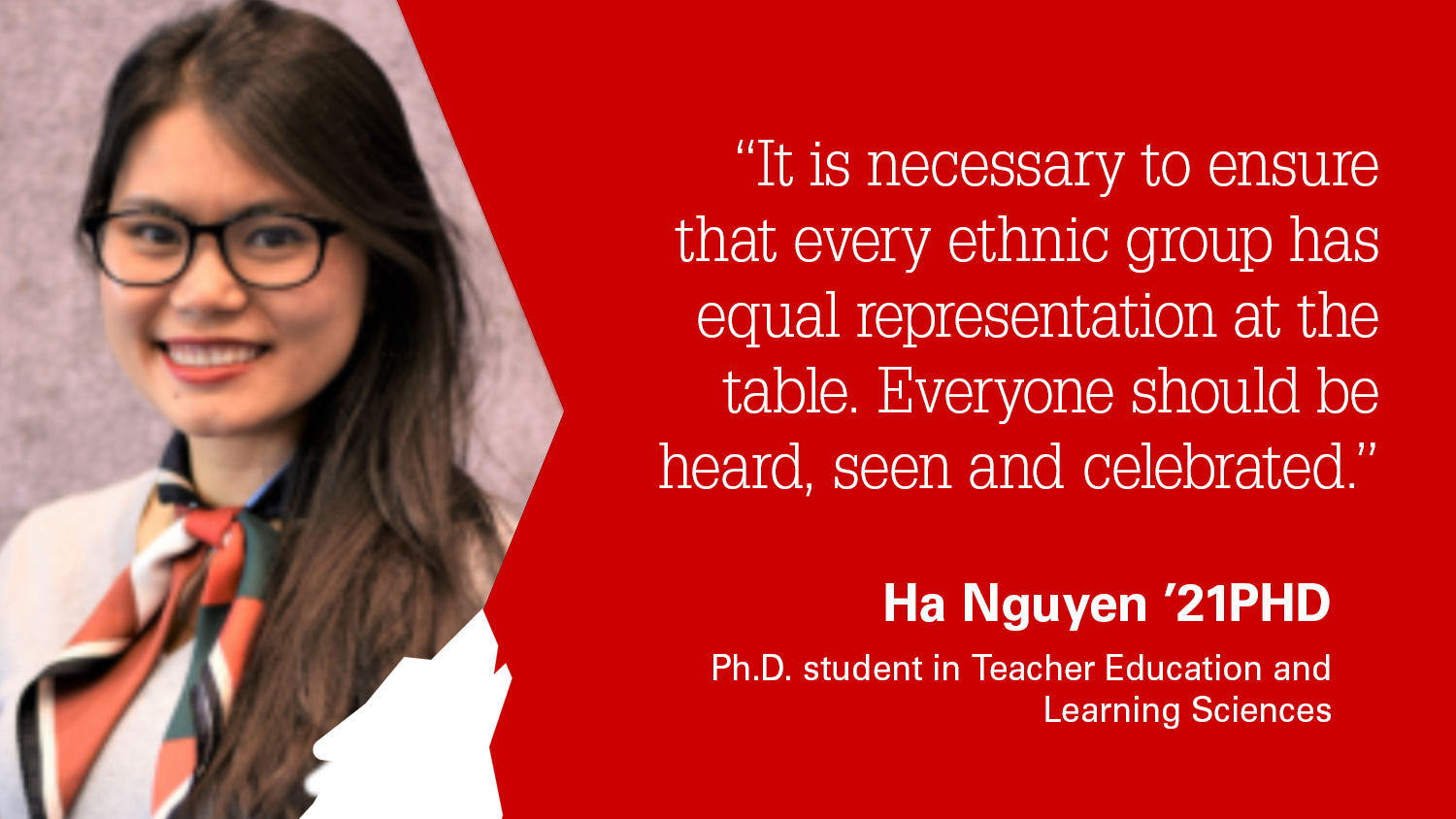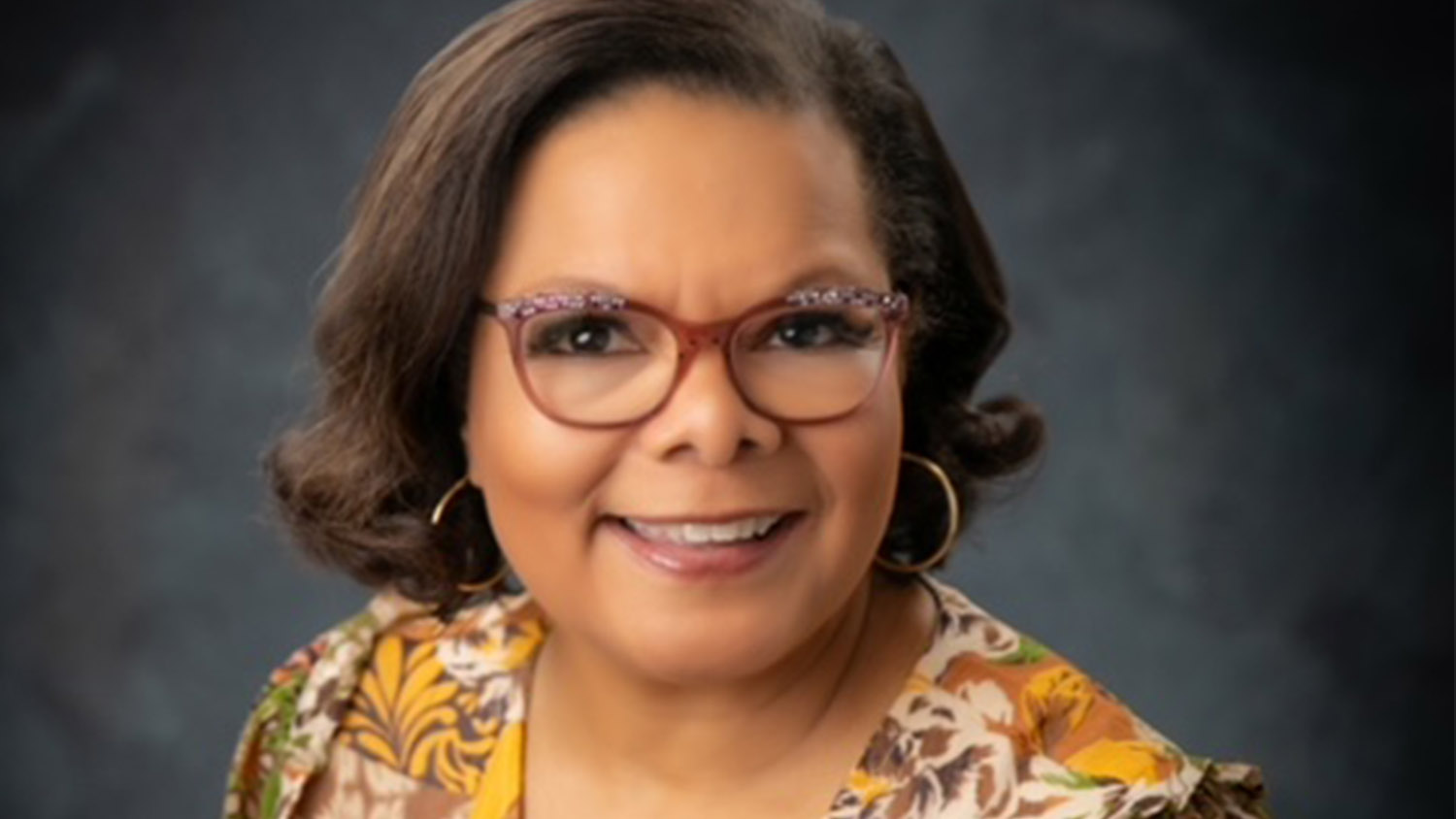In each edition of Pack IDEAs (Inclusion, Diversity, Equity, and Access), a newsletter released by the NC State College of Education Change Agent Task Force, we highlight faculty, students and alumni who have expertise and experiences that align with advancing diversity, equity, and inclusion (DEI) within the college. In becoming an anti-racist college community, we must deepen our commitment to creating and sustaining a healthy teaching and learning community that uplifts the humanity of all people, but especially Black, Indigenous and people of color, who due to structural inequities are marginalized in education and society. The spotlight feature offers a counternarrative that celebrates and showcases the brilliance of individuals within our college community.
Ha Nguyen ’21PHD
Ph.D. student in Teacher Education and Learning Sciences Literacy and English Language Arts (LELA) Education program area of study
Why is diversity, equity and inclusion in education important to you?
Of all the critical diversity, equity and inclusion (DEI) issues, I am particularly interested in DEI in poverty gaps, gender inequity and international students’ rights. These causes have become close to my heart due to my background and experiences in Vietnam and in the U.S for two reasons.
First, DEI is important to me because I firmly believe that we all have the potential to grow despite our background, identity, and ability. However, without access to efficient resources and information, many people will not have opportunities to grow to the fullest. Although I could get over my family’s economic hardship and the lack of resources and information in a low-resourced developing country, it was a tough time. My struggle represents many individuals in low-resourced areas who want to be the change they want to see in the world. But how can they believe in themselves as change agents if they are trapped in the dark without a sight of light for so long?
Secondly, DEI is important to me because I firmly believe that everyone has a story to tell. Therefore, everyone deserves to be heard, seen and celebrated. Making change is an act of courage. Only when we step out of our comfort zone can we change for what we all deserve.
Are you currently conducting research around the area of diversity, equity and inclusion? If so, tell me a little about your research.
My dissertation surrounds intercultural competence and native speakerism in English as a second language and foreign-language (ESL/EFL) education. Intercultural competence (IC) is the ability to communicate with people from other cultures. Native speakerism is discrimination that views nonnative English language teachers as deficient or ineffective models of the English language and cultures despite their academic degrees and teaching experiences. Using topic modeling and qualitative analysis, this mixed-method case study has three-fold purposes. First, it examined how nonnative English language teachers in developing countries demonstrated their own IC in an IC-focused Massive Open Online Course (MOOC). Second, it explored how these teachers perceived the roles of IC and the explicit IC teaching in English language education. Finally, this study examined how this IC-focused MOOC impacted the nonnative teacher participants’ own IC performance and perspectives toward IC and IC teaching.
Two emerging findings are worth noting. First, the findings found that the teacher participants did not possess native speakerism. Second, the teacher participants acknowledged the power of knowing their own culture in improving IC performance. These two emerging findings might explain why the teacher participants felt empowered to take ownership of the English language and culture, contrasting the conventional image of nonnative teachers.
What are you hoping to accomplish as a result of your research and how do you hope it impacts the field of education and learners?
This study has the most extensive scope of Intercultural competence-focused research, with 727 participants from 87 countries, of which 95% came from developing countries. Hence, this study helps portray an international profile of nonnative English language teachers in developing countries, informing the instructional design and implementation of international teacher professional development at scale.
As the existing IC literature is predominantly U.S.-centric, which inevitably reinforced modern imperialism in ESL/EFL education, this study responds to the call for more voices of nonnative teachers from the global South.
Also, as nonnative teachers in developing countries have unique needs and characteristics, I made an adaptation of the existing theoretical framework. In the future, I plan to test, refine, and develop an intercultural competence model and training program tailored particularly for nonnative teachers in developing countries.
Are there community projects and/or initiatives you are involved in that are related to diversity, equity and inclusion? Tell me about those projects.
With a strong management and industry focus, I have been taking various DEI-related leadership roles in a wide variety of organizations at local, national and international levels. First, since 2017, I have worked with the U.S. Embassy in Vietnam and my colleagues to organize the annual VietTESOL Conferences, resulting in the birth of the VietTESOL Association in the same year. It is the first and only national association for English-language teachers in Vietnam that provides a playground for Vietnamese EFL teachers to exchange ideas and collaborate with international colleagues.
I have provided free online training and webinars for ESL/EFL teachers in developing countries in collaboration with the Regional English Language Office (U.S. Embassy) to address the needs of English language training and resources in the region. I have also been active on the leadership board of the TESOL Intercultural Competence Interest Group and the World Council on Intercultural and Global Competence, contributing to the dearth of voices from the global South in intercultural competence narratives.
Finally, I have been the College of Education ambassador for the Advancement of Women Entrepreneurs at NC State University since 2018, helping to increase female educators’ awareness of entrepreneurship in education.
What do you hope to teach future educators and scholar-leaders about equity and inclusion in education? How do you incorporate that into your instruction and curriculum?
DEI is already important in every aspect of life, but it is even more critical in education, as education aims to create people of capability and kindness. Improved DEI in education helps students feel belonging, confident and empowered to grow. DEI is also a complex task that requires long-term collaborative efforts. Indeed, it is not a task that can be achieved overnight. It is not a work of an individual but reflects the culture of a community. Therefore, it is essential to help each and every community member understand their roles in making the community a more welcoming place for everyone.
DEI needs to be addressed for all ethnic groups simultaneously so that no groups feel left out of the big picture. However, it is possibly naïve and even harmful to assume equal treatment for all ethnic groups simultaneously, given the current severe disparity in the socio-cultural and political climate in the U.S. Hence, DEI efforts may look different to varying degrees for different groups simultaneously. However, differences in the focus should be minimized and should not last for an extended period to avoid biases and discrimination.
It is crucial to realize the power of curriculum and instruction in shaping the directions of the narrative. Hence, having an open curriculum with diverse activities will provide students with opportunities to explore the DEI issues themselves. These activities include open dialogues, guest speakers and extra-curricular activities with people from different ethnic groups, sectors and offices in and outside classrooms. The more we interact mindfully with people from different ethnic groups, the more we can triangulate the information and learn about them.
Is there anything else you’d like to share with the College of Education community?
DEI is a collective work to make the college and university more diverse, equitable and inclusive for everyone. DEI is not about me, you or they, but about us as a whole. It reflects the culture of the entire community. The question is: How do we TOGETHER build the college and university the way we want them to be? The answer lies in the strength of the Pack. It is necessary to ensure that every ethnic group has equal representation at the table. Everyone should be heard, seen and celebrated.
It takes courage to change. From the seed will grow a tree.
- Categories:



